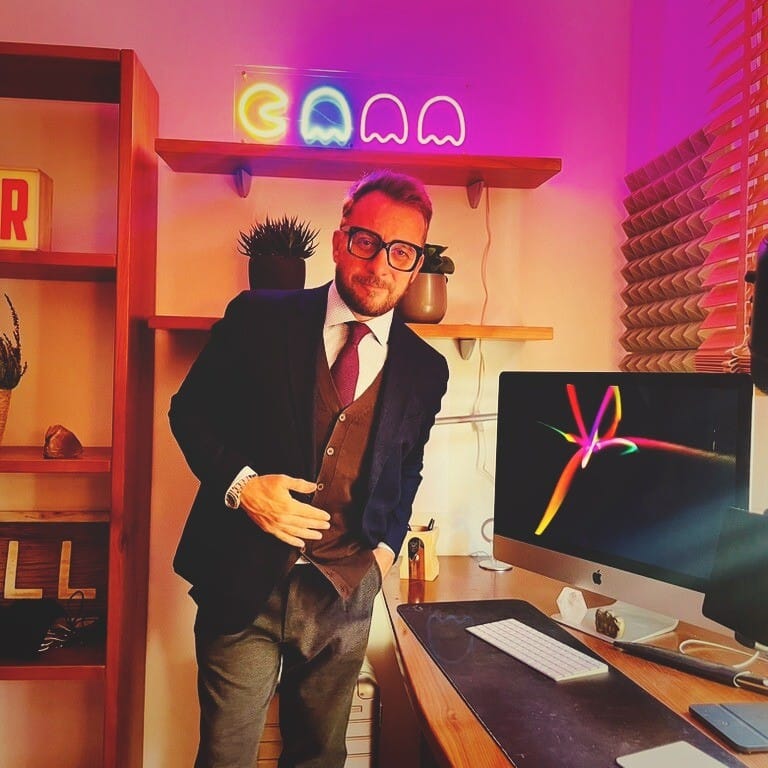Interesting Journeys Into Petpreneurship: Rik Cridland
In part five of Interesting Journeys into Petpreneurship, we talked to the Founder of guinea pig startup HayPigs! about his awesome toys and treats.
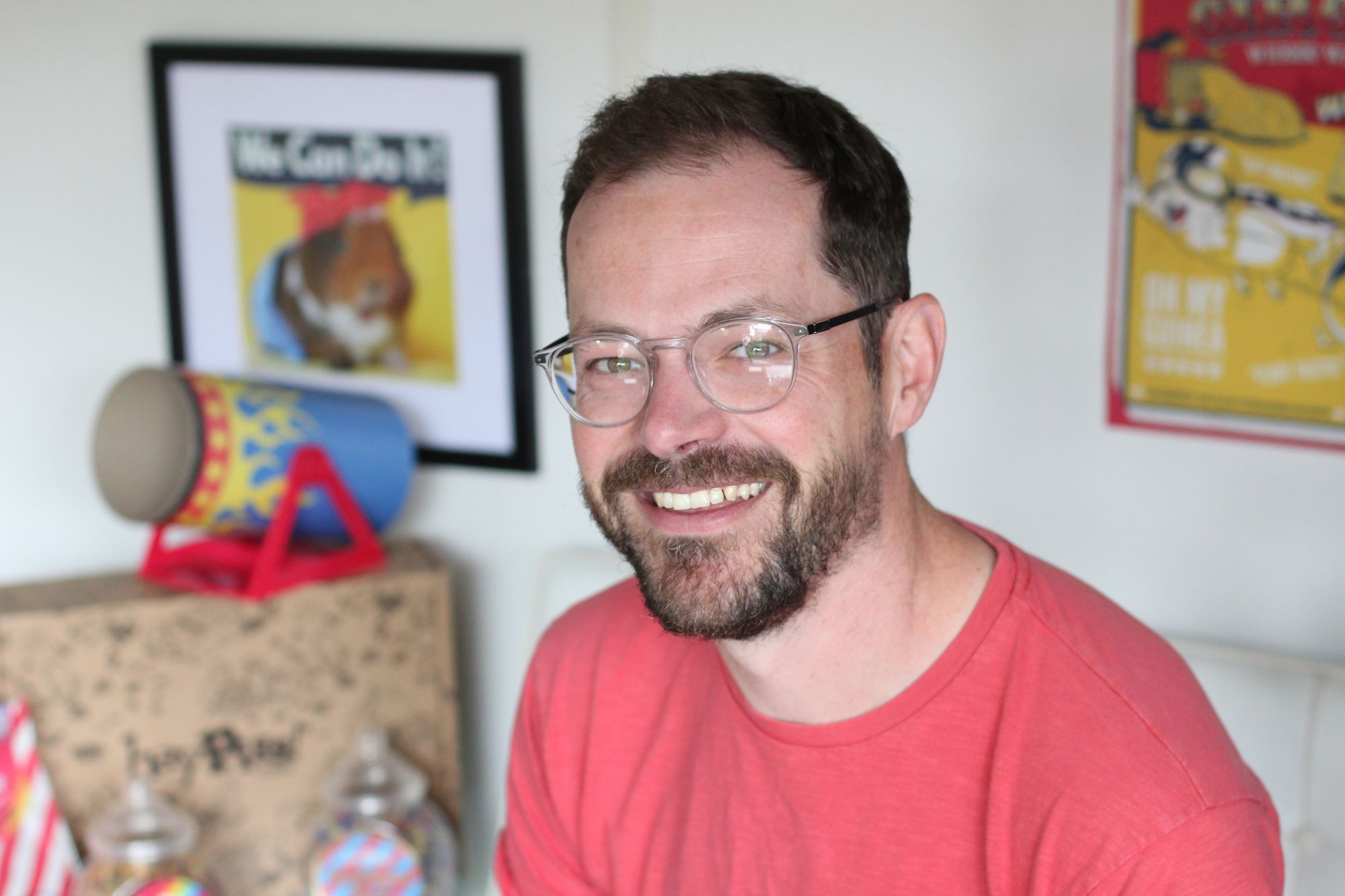
I had heard about Rik from other entrepreneurs. You have to go talk to the guinea pig guy, they told me. He founded a startup focused on guinea pigs. My first thought was that the man must be mad, but as you will see, he isn't mad at all. He is actually an award-winning product designer with sharp commercial instincts, creativity in bundles, and a gift for creating incredible products for guinea pigs.
His startup story is remarkable, and so is the company he created.
Over the last two decades I have met thousands of entrepreneurs, and Rik is one of the most interesting I have met because of the company he founded.
I am very pleased to introduce you to Rik Cridland, the Founder of HayPigs!
Guy: So Rik, let's talk about your interesting journey. How did you approach this industry? What were you doing before life in the pet industry?
Rik: I trained as a product designer and was a professional product designer for 15 years. I got my break starting with promotional merchandise, predominantly things in the drinks industry and giveaways for places like Boots. I generally worked with very tight budgets to produce promotional widgets.
Then, I progressed into a position in London in the film industry, working on merchandise for the film industry, which is obviously very cool. I had to design everything from the giveaways in the cinemas to gifts and prizes. One of the key points with the film industry is that you often create a range of products around one film. So, I was used to this idea of ranging, and I was fascinated by it.
Guy: That sounds like wonderful work, good clean creative fun!
Rik: It was. It was also extremely stressful. I mean hundreds of products turned around over a three-year period, and it was incredibly intense. I didn't get on with office life. I've always probably been a bit of a rebel and always wanted to do things better or change things. You find that in an office culture it comes down to what the owner wants to do, and there's only so much you can do personally.
I think I found that frustrating.
So I quit my job, stopped commuting to London, and set up my own design consultancy from home. I was lucky to have built a strong network in London, which was my biggest advantage. I had worked with some really high-profile clients like Disney, and it set me in good stead to go out on my own.
Guy: Am I seeing industry awards on the wall there behind you?
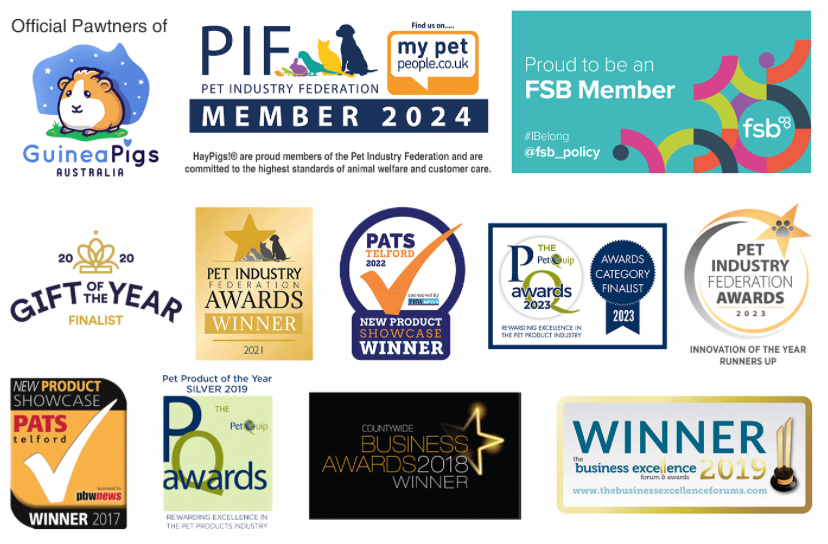
Rik: Yeah, the innovation awards I have won over the years are great for exposure. I was a good designer, and because of the track I took, I did all sorts of design, from the product to the graphics to the packaging. So I've got a really good range of experience, going as far as even creating some industrial stuff like a kettle and domestic iron. My career was good, but I had done everything I wanted to do.
I think the rewards as a product designer are ultimately seeing the products on the shelves and seeing people using the stuff. I'd done everything I wanted to do in that respect, and I remember being a bit frustrated by that, but then I got married.
Guy: When was that?
Rik: Now you've got this on record, but I don't know the date. Was it 2012 or 2010? One of those two. I always muddle them up. Probably 2010, I'm going to say that. As a young couple in our first home, the idea of having a pet inevitably seemed to come up, and my wife had had all these small animals when she was growing up, she'd had rabbits, hamsters, and gerbils.
She had never had a guinea pig, and she was looking at guinea pigs online. Then the algorithms fed her a feed from a local rescue guinea pig rescue in Chelmsford, and she said, "Oh, shall we adopt some guinea pigs?"
Guy: Can I just get some clarification? I am obviously ignorant, but aren't guinea pigs, hamsters, and gerbils all the same kind of pet? Are they?
Rik: They're all in this small animal category, and I would say there are 10 animals in this if we include pygmy hedgehogs as well, which are slightly on the edge. So yeah, you'd have your rabbits, guinea pigs, hamsters, gerbils, rats, mice, degus, chinchillas, hedgehogs, and one another that I've missed. Ah yes, ferrets.
But to the people who are into small animals, they're all completely different, and it's a bit like having a cat and a dog. They want completely different things, and they have completely different personalities and lifestyles, but when I got into small animals and started buying products in a pet shop, I went into the small animal section, and you wouldn't have a guinea pig section; you would just have a generic section of products for any small animal, there was nothing specific there for guinea pigs.
Nobody had ever tried to create any products for guinea pigs or in fact any of the other small animals beyond what you might expect to find in any pet store. Interestingly, no one had niched down another level and created a guinea pig product. But against the backdrop of a hugely complex dog and cat-focused pet consumer experience, guinea pigs were the afterthought in the corner.
Often, particularly with the smaller retailers, the little independent retailers, the small animals section is that little column at the back; it's that little afterthought. And when we were adopting these two guinea pigs at the guinea pig rescue, the lady said to me “oh you're a product designer, do you design any products that have guinea pigs on them because I'd buy anything that has a guinea pig on”.
And that was the little seed in my head. I replied, "No, I don't, but I could."
I went away and thought, Why do people not make guinea pig products? Why do we have small animal products but not guinea pig products? Is it too niche?
I looked at it, and obviously, what I really liked about guinea pigs is that they are massive on feedback. So they make loads of different noises, and there are lots of gestures. You can tell if a guinea pig's happy, pissed off, horny, or frustrated.
They have clear personalities and know how to express themselves.
Guy: That's amazing, I had no idea. And they're quite big compared to a hamster?
Rik: Yeah. In a pet shop, people see the baby guinea pigs, and frankly, the number of times I have seen them muddled up with hamsters is too many. But the boars can get really big, we adopted one that was two and he liked his food, you know.
Guy: And you called him a boar?
Rik: Of course, he's a pig. Yes, of course. Even though they're rodents. But yeah, these boys were full of personality, and the products I bought for them were all right, but I could tell the boars found them boring. Everything was either wooden, wicker, brown, cheap, or generic. There was no colour, nothing eye-catching or interesting and too much of this generic sameness.
So I've sat there. I work on my own pretty much, you know. I've sat with the guinea pigs outside, you know, they're in the run. They've destroyed most of the toys and things that they've had. If you can call them toys, a lot of it's just blocks of wood that they chew on because they're bored and I thought that's not enrichment.
If a guinea pig is really excited, I mean really excited, they popcorn and popcorn is where they twitch, have a little spasm, jump up in the air, and spin round. They lose control of their bodies. This could be over a blade of grass.
If they really like that blade of grass, they'll let you know.
From a product point of view, I can tell, first of all, if they show interest in it, get excited by it, and keep returning to it and using it again. So, actually, they're really good little product testers.
Guy: I can picture you happily sitting in your garden playing with guinea pigs.
Rik: Ha! But you know, it allowed me to think about these ideas, and make little prototypes to then see if they'd use them. So you have a feedback group there, a little focus group of guinea pigs. One of the early strap lines was tested by guinea pigs. All of our products have been designed and tested by guinea pigs because they were giving me all the feedback and I worked on that process with them.
I designed some really good products that ended up not happening because the guinea pigs weren't interested enough. You know, they had to be really into it. They've got their own idea of what a great product is. Well, they have.
Guy: What does that product testing look like? It sounds fun!
Rik: We usually have about seven or eight guinea pigs that are always product testing. And we have lots of fun. I make up new toys for them, and I can 3d model it, 3d print it, build a working prototype, put it in with them, and see if it works.
It's fantastic. We develop it, fine-tune it. So yeah, having worked in the film industry, I was really fascinated by these ranges. And I looked at the pet industry, and I was like, I'm not seeing range as much, certainly not in small animals. Yet it's a really good way of getting people to repeat purchase, and I know from what we can see in the guinea pig community that people love theming their cages.
Guy: I had no idea this community existed!
Rik: So why couldn't we have themes that the guinea pigs can collect?
Guy: I see no reason why they shouldn't have themes for the guinea pigs!
Rik: And there were various ideas that I came up with, you know, there were space themes and Wild West themes and medieval themes and all sorts that haven't really come to fruition yet, but they could. But the theme that we actually went with, again, a bit of an accident, um, was a circus theme. The circus theme was nice because it was approachable, bright, colourful, and unisex.
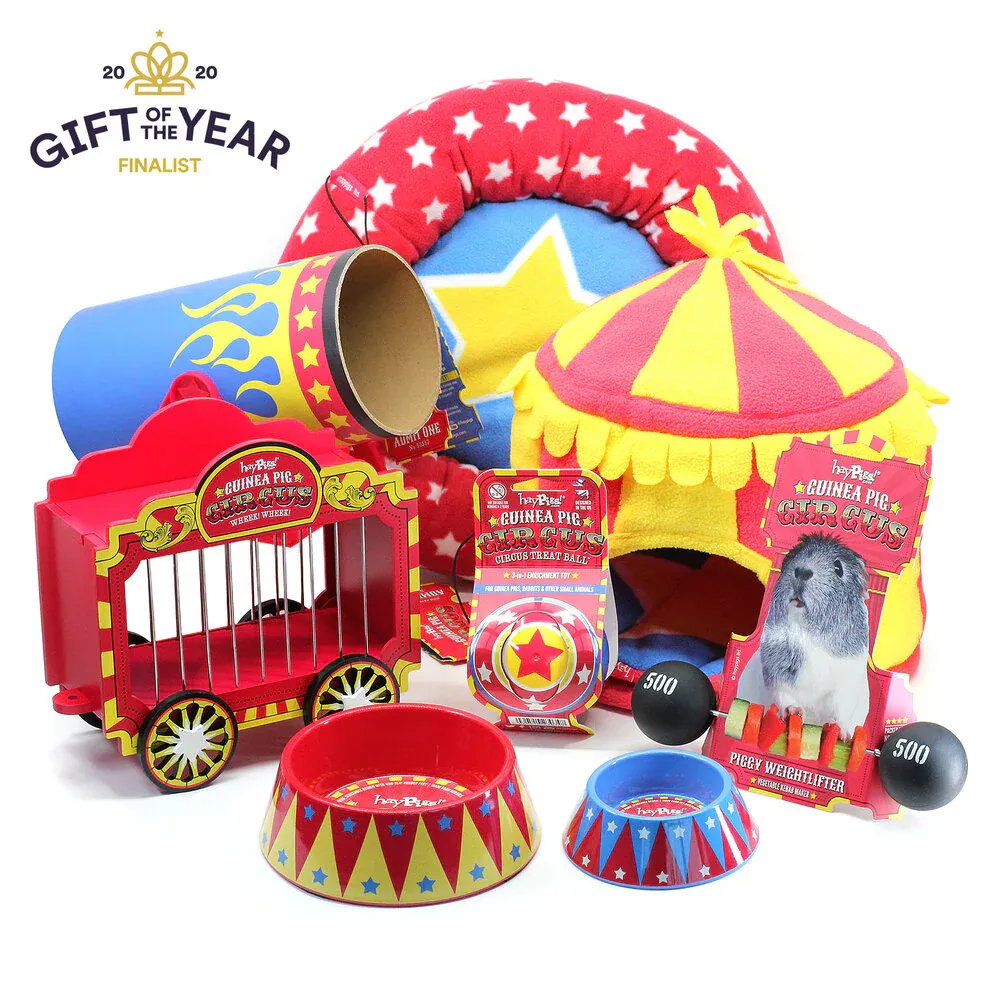
We stumbled into the idea of doing circus-themed guinea pig accessories because we had a big outdoor run that our pigs used in the summer. It had a cover that you could put over the top to keep the shade from the sun. But what typically happens in the UK is you've got a glorious day, and then suddenly there's a rain shower.
And if there's one thing that guinea pigs hate, it's the rain.
Guy: They hate the rain?
Rik: They can deal with cold or hot temperatures to a point, but when they are wet guinea , they are definitely not happy. You know, I told you about the mannerisms and being able to tell the guinea pig that's pissed off. Well, when they are wet, they get really pissed off.
The cover on their run didn't really work when rain came. The whole top would dip, and water would start dripping through. I got a cane, and I stuck a cane up in the middle of this sheet to lift it up. So the rainwater would run off, and it just, it was a circus top, you know, it was a circus top. So I was like, great, let's make a circus top. There's the first product.
We're going to have a circus top run for guinea pigs.
Guy: It was your first product?
Rik: It was in theory, but when we got it costed up the investment was significant, and having come up with the idea of this circus big top, I also came up with an idea of accessories to go with it. And in the end, we didn't do the big top. We did all the accessories to go with it instead and launched using those!
Guy: Wow, talk about niches within the pet industry!
Rik: Ha, right! So, so yeah, so we're going to launch, um, a guinea pig circus themed business based around creating enrichment toys and feeders for guinea pigs. That's how it started. It was very, very niche.
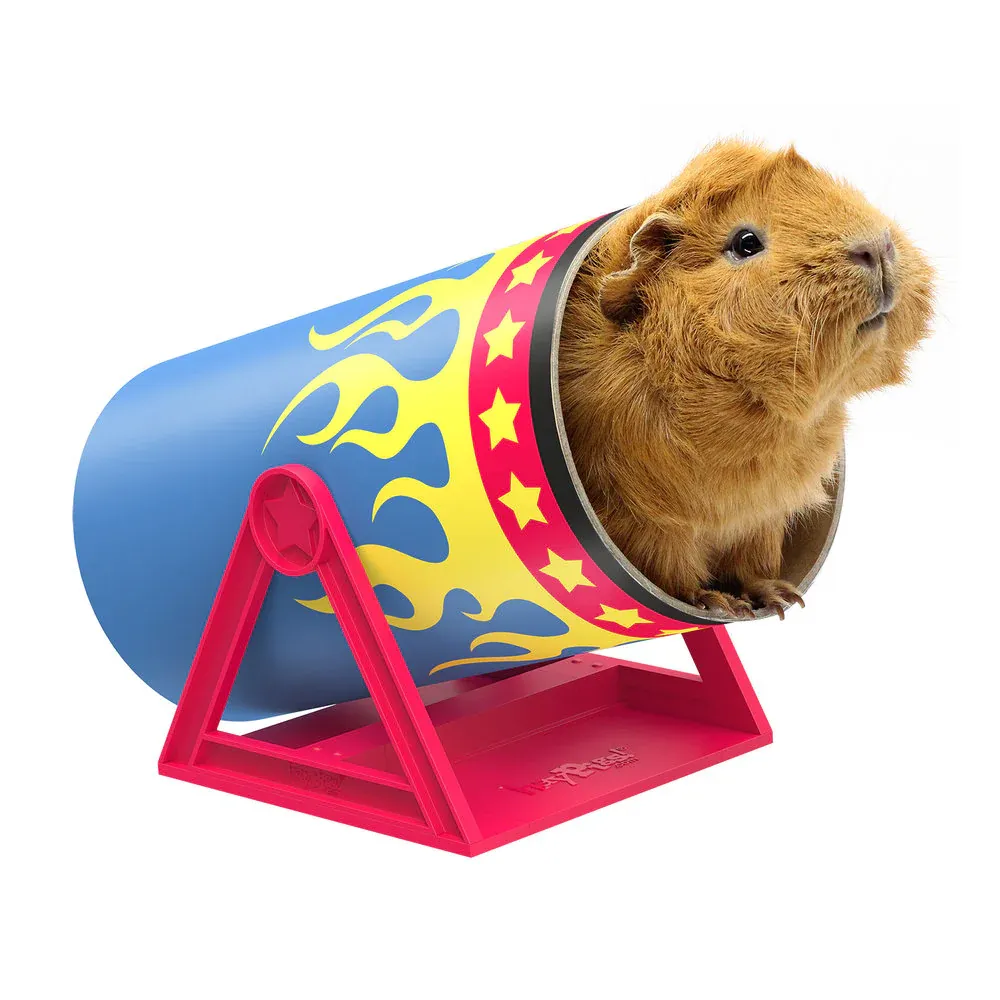
I did the design work using a couple of people that I've worked with in the industry, so we had some really good sourcing agents. They went out and found the factories for me, which de-risked that a little bit because I was effectively going in cold.
Once products had been made we'd get it all delivered to a warehouse in the UK, a fulfillment warehouse we'd sourced. So day one, having designed six products for our starter range because it had to be more than one product we thought.
So we started with six brand new guinea pig products, all completely original.
Guy: That seems like you are asking for trouble product-wise.
Rik: Even worse, we ordered 3000 of each. So we had 18k products on the way.
Guy: Holy smokes, Rik. I would have been scared, that a lot of money was invested. You must have faith to launch six super niche pet products at once.
Rik: There's a lot of faith, but I think there was a huge chunk of naivety.
I think there was a foolhardiness. There was also a huge belief in the quality of the products. I never doubted them. You know, I think one of the things I became quite well known for as a product designer was detail. And I knew these would be the best products on the market. But we'd be asking people for more money than they're used to paying; the prices would be higher, but the quality would be higher.
Guy: And how did it go? Did you sell everything?
Rik: Yes, we sold everything eventually!
One of the first people I actually approached with the concepts was a lady named Niomie who had a business in Australia called Guinea Pigs Australia. She had effectively done what I envisaged we could do in Australia.
She had a business focused on Guinea pigs and all the Guinea products and food that they needed, and she'd done it in Australia, where, at the time, no one was doing it. She is my Aussie sister, we get on really great, and when she saw the products, I said, would you be interested in stocking these products?
And she said, Oh my goodness, Rik, I'll have them all; they are brilliant! So, ironically, we were selling hay pigs in Australia before they landed in the UK.
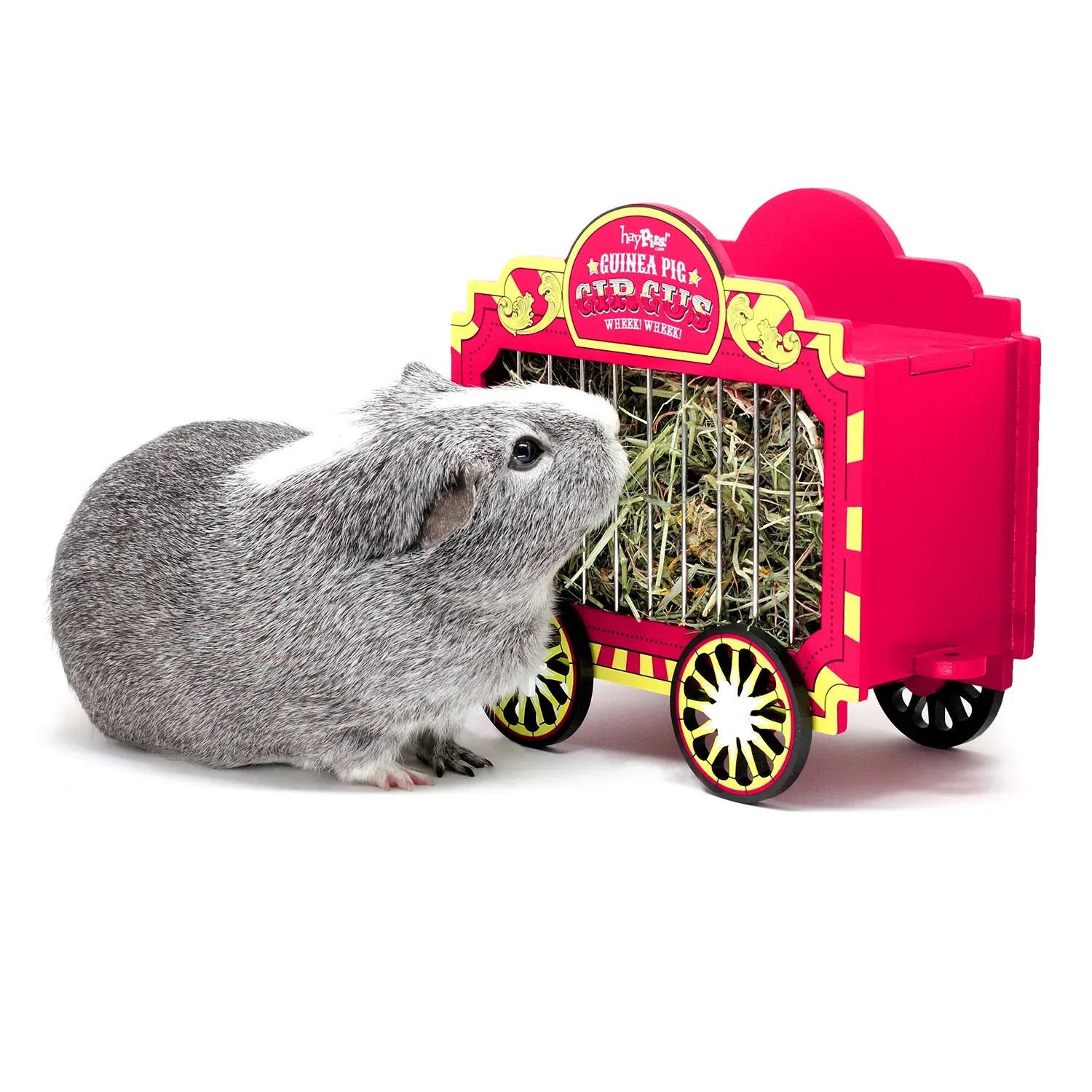
Guy: Fantastic. International before you even really start!
Rik: But I guess if you're asking about that faith question, is this a good idea? I've got someone who's already selling Guinea big stuff, telling me these are great. We'll have no problem selling them. Right. So there was that, that was that positivity.
Guy: Did people generally like your products?
Rik: Interestingly, we spoke to a buyer at one of the larger retailers in the UK, and they really didn't like it. They didn't like the circus connection. They didn't get the concept of the parody. They didn't get guinea pig people or the idea that they mostly make their own toys because there aren't any out there on the shelves.
We learned a lot from the wonderful community. You could see what people were doing at home, making toys for their guinea pigs. Many of the best ideas have come from people who have a problem and have created a solution.
One of the most popular caging systems for guinea pigs still is effectively a modular shelving unit turned on its back, people have managed to adapt it with cable ties and little cork inserts to make it work. You could see products being created in the community, by people with a passion for their guinea pigs.
Guy: An underserved market?
Rik: Exactly. We could see people adding some personality to their cages, but they weren't buying it in the pet shops. They were making it themselves or buying it from someone making these toys in their back room.
Guy: Sounds like a market desperately in need of good guinea pig toys!
Rik: Right, that's a strong sign of market demand there. People are making the products themselves because they can't buy them.
Guy: You saw the signs Rik.
Rik: Yeah, people sometimes ask me why I am focusing on guinea pigs when dogs and cats are the biggest market. Because everyone's doing dogs and cats, it's absolutely saturated. We could have a big slice of a little pork pie that is guinea pigs, you know, instead of trying to get a sliver of pie from the dog market.
Guy: And the community are screaming for new products.
Rik: Right; the community here for guinea pigs is just as enthusiastic as it is for the dogs and cats. It's just a smaller market, but it's bigger than you think.
Guy: Wow, thats a great origin story. I had expected you to be a bit of a nutter, some sort of mad guinea pig boffin. Please forgive me!
I now see that you approached this as a professional. You're a professional product designer, and you came in. You identified a non-explored commercial niche within the pet sector. You leveraged your network, existing experiences, instincts, and intuition to bring this business to market. That's a fantastic entrepreneurial story.
A great founder origin story. It really is!
Rik: Thanks!
Guy: It can’t all have been smooth sailing through, right?
Well, we had a couple of mini disasters straight off the bat. And I think this was possibly the hardest month of the whole thing, actually. And it was right at the beginning. First, the large retailer really poo-pooing our product idea wasn't great. Then, our first storage bill, when it landed, was a surprise. I've got to admit it was bigger than I thought. It was like a mini mortgage. All the stock arriving shocked us. A container of goods arriving in this new warehouse suddenly gave us a reality check on how much stuff we actually bought.
A couple of the products had some problems. There were minor problems in the grand scheme of things, but as a perfectionist product designer trying to learn not to be such a perfectionist, I found issues with the packaging that drove me mad.
Guy: That's really interesting because I think it's a good example of how hard product design can be. You're an experienced product designer and had experienced sourcing agents, yet your development pipeline still ran into technical issues there.
Rik: Yes, yes. And as much as you can approve it, it's done once it leaves the factory. You are then stuck with whatever mistakes have happened. We got around these problems. The interesting thing about the packaging problem was that the guy that eventually fixed the problem became a major production partner and has been for our entire journey. So it was a happy coincidence. Teething problems, right?
Guy: Right, nothing you hadn’t seen before.
Rik: Yeah. So, you know, we created this hands-off scenario where orders come in and go straight to the warehouse, and then they get fulfilled without us really doing much now.
Guy: Did you raise any external investment?
Rik: I put a business plan together for this idea. I knew nothing about investors or investment at the time. I was very naive with all of that, and I had this idea that I could probably do it all for about 70K. I was practising pitching this business plan to my parents to get some experience before I pitched to investors.
Guy: What did they think?
Rik: My parents turned around and said, "We'll back you." And I was just, I was shocked because I had no concept that they were going to do that. I had no concept that they had those funds anyway. They'd been two professional teachers. They worked hard all their life. They'd always been really tight with money.
Guy: Sounds like they knew a winner when they saw one, Rik.
Rik: I don't know if I've won yet. But they effectively said, "Look, you can have your inheritance now while it's useful to you." Why wait until we're not here? Just do it. Just go for it. Fantastic. And I was completely blown away by it. I still am.
Guy: I bet! But that came with its own set of challenges, too, right?
Rik: For a long time, I've got to be honest, the early days, it was a big weight on my shoulders actually, when times were tough, because I was thinking, "How can I ever repay this?" I might have just blown it all. That's your parents' nest egg you might have blown, right? It was one of the most stressful times in my life.
And they just said, "Look, if we never see that money again, don't worry about it."
Guy: Wow, what open minded investors! I wish they were all like that!
Rik: It was a big relief. I still felt that I would get to the point where I had an opportunity to repay that faith somehow.
But that's where it started. Yeah. Stressful.
Guy: Do you know what, though, Rik? I've blown up startups before with investors involved and quite a lot of money involved. Good entrepreneurs blow up startups sometimes; it's always a learning experience. The best investors, who are typically high-net-worth individuals, will say to you, "Don't worry about it. You tried your best. You did a great job." They knew my startup was a risky investment.
And it's just a really nice attitude from investors as a founder.
Rik: I'm incredibly fortunate to have been in that position, but it means that eight years on, we're still a 100% family owned business.
Guy: Fantastic! Is your mum your boss then?
Rik: No. They don't even look at the figures!
Guy: So you've launched your first range. It's started to do well. How have you done since then? What's the journey been like since then?
Rik: Yeah, well, we built a decent community of followers. We were getting known for these great products. We've always had a strong social media side of the business and community there. And yeah, we've had opportunities where we were in all three of the largest biggest retailers in Australia, for example.
So you'd launch over there in a big retailer, and it might be like a new production run paid for, basically. But keeping the traction seems to have always been the challenge because we have niche accessories, and that's where we were for the first three or four years. Only these, you know, enrichment toys and accessories. And you buy them once, and they last because they're really well made.
Guy: So you don't need to buy them again?
Rik: And once you've got the range, you're done. In a retail space where they want to turn the products around really quickly and not have things hanging around on shelves. A niche like ours without consumables, edible treats, hays, things like that, just accessories that are a higher price point than is a normal purchase for many people. It just didn't work very effectively in the retail setting for the big boys because the products were not turning product around fast enough.
And I think that's where HayPigs! the brand was born.
Guy: That's interesting; you spotted a flaw in your product flow.
Rik: In my brain, HayPigs was always something much bigger. We were building a brand that surfaced with stage one. And I think, again, the whole lockdown that hit us in 2020 was probably quite useful. Because Far East shipping became a big problem.
Reliance on Far East goods was risky. Prices were shooting through the roof for various things, like shipping, which went up 300%. There were all sorts of challenges there. So we had to consider how to make our business a bit safer.
Guy: What did that look like?
Rik: We asked ourselves, can we produce anything in the UK? Being called HayPigs, we were approached by a farmer who had lots of high-quality Timothy hay, so we started selling British hay. We put our brand on it, and we put it in this potato starch bag. It was all organic and compostable, so it was a bit different.
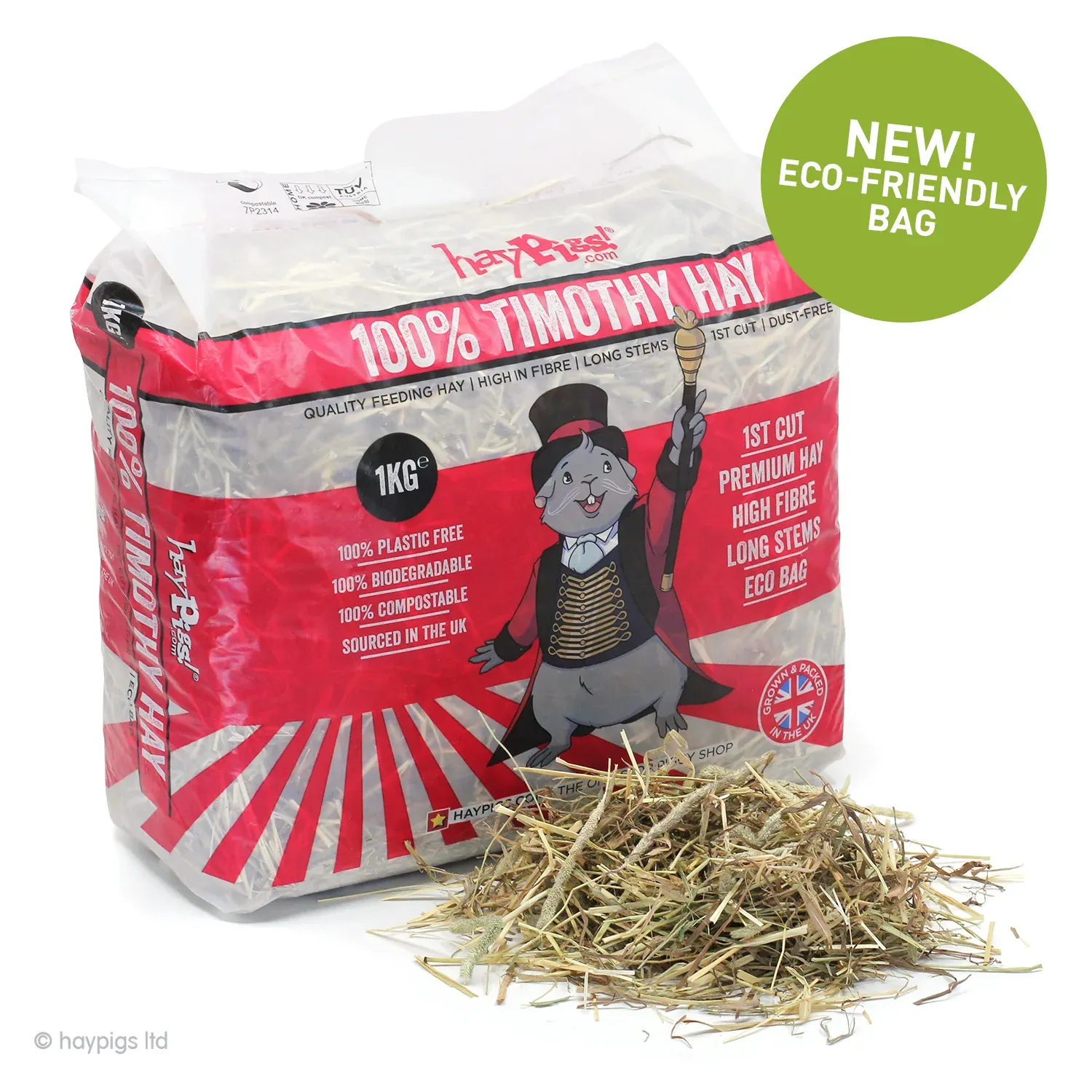
Guy: You straight-up sold hay?
Rik: It was a kilogram of hay, and we got that on Amazon, got it on our website, and suddenly, it started out selling everything else we do.
Guy: Wow. That's a nice surprise though!
Rik: The clue was in the name, HayPigs, so we thought clearly this brand thing works. But it is just hay, and lots of other people do hay. We're not the only brand that sells hay.
Guy: Why is yours selling so well? What have you got right here? Is it the sizes, price point? Is it the eco element to it? Is it the quality of the HayPigs brand?
Rik: All of the above, a bit of everything, it's got our name on it. So subsequently thought, well, should we do some more edibles? Because the nice thing about edibles is people come back for more. Guinea pigs are pretty greedy little pigs. They love their treats.
So then we launched Piggy Nom Noms in a couple of flavors of treats and they went down really well. They were for guinea pigs and rabbits, we branded them as actually a guinea pig and rabbit on the front cover. And, and yeah, all of a sudden, we doubled our market size, and the brand still stands up. It's incredible.
Guy: It is! I love the name piggy nom noms!
Rik: Then we thought, should we bring out some range of forage treats?
Guy: Forage?
Rik: Yes. Forage. So forage is, it's all the sort of botanicals, herbs, leaves, flowers, that guinea pigs would forage in the wild, if they were in the wild. They're really good, really full of fiber, full of these nutritional elements that are great for guinea pigs.
Guy: Brilliant creativity, you must have had fun creating these products!
Rik: We did! We even created this range of ‘Pig 'n' Mix’ treats that were like little sweetie jars and a paper bag that was again, recyclable, you can refill these jars or the bag. And we made fun names for them. So they had like the fruity salad mix and the bubble gum buds and strawberries and cream and, you know, tasty rainbow. They were all puns on kind of retro sweets and drinks, and then suddenly, we've doubled the number of products in our store that we started with.
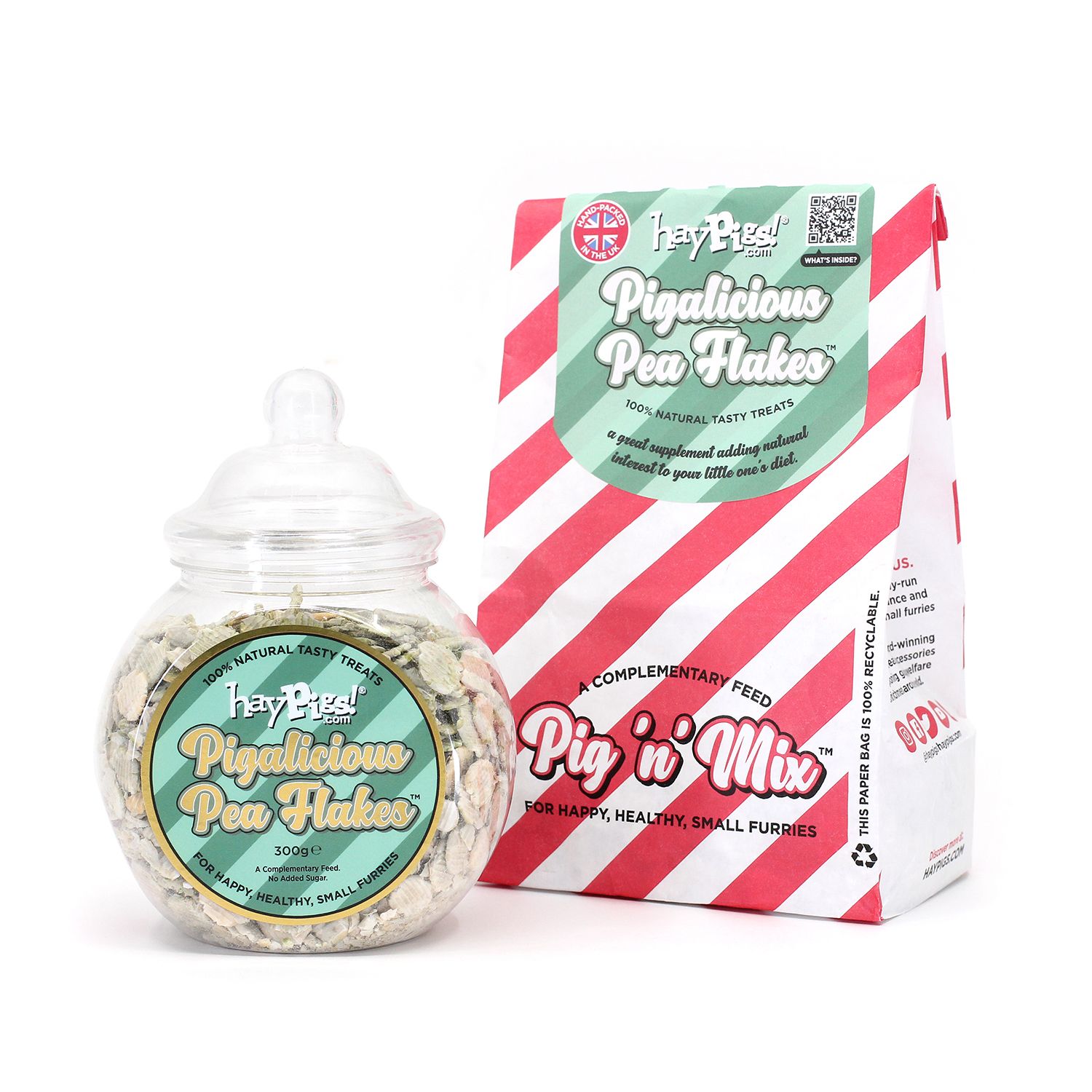
Guy: I find it really interesting how you pivoted in that direction after originally starting out as an accessories company. It was clearly a good move.
Rik: It was, we have all these edibles that are creating replenishable goods for us that led us to do our own subscription box, and the business keeps on developing.
We still sell accessories. We still do them; I love doing the accessories.
But there are market forces, and HayPigs' outlook has broadened from what was initially a really niche guinea pig circus accessories startup to becoming small animal enrichment experts who make everything from toys to treats and accessories for your guinea pig, rabbits, and other small animals.
Guy: Wonderful! That is a fantastic entrepreneurial story.
You went from playing with your pigs in your garden and making toys for them to recognising that consumable products make your business infinitely more sustainable over the long term, pivoting in that direction and leveraging them to boost sales across your brand. That's a hell of a journey right there!
Rik: Yeah, and all those pivots that have happened, they've happened probably because something's going wrong. Maybe you've been dropped by one of the large retailers, you know, or maybe, as I say, the price of shipping shoots up, or maybe we have Brexit, which was not very helpful at all if you are shipping internationally from your website, and all of a sudden we can't get dandelion leaves into Ireland.
And we have to shrink back down again, evolve and adapt.
We've always been very nimble, and that is the advantage of being a small family business: We can change direction, try things out, think on our feet, our paws, I guess, and make these decisions.
Guy: But hold on a minute, a small family business? You just described extensive product development cycles across wildly different ranges of products, right? And I'm hearing you're global; you're selling these products globally to a significantly larger audience than when you started out. Are you still just a family business?
Roughly how many people are working on HayPigs?
Rik: Okay, there is me and my wife, but my wife's only in the business twice a week. Eight guinea pigs do much of the testing, fairly critical team members. We have an Amazon consultant who helps run the Amazon side of things. Our warehouse team, the 3PL warehouse team, does a lot of the logistics there. And yeah, we have some help with a digital marketing agency that does a few bits. Everyone else is then just plugged into that. So we might employ an illustrator to do something, or we might do that. But we are a very, very lean team.
Guy: That's interesting because it sounds, just from your business scale and complexity, that you have a large organisation over there, but you're actually still a small family business leveraging outsources, contractors, and third parties on an ad-hoc basis to multiply your core team's efforts. That's really interesting.
Rik: Yeah. And that obviously costs, it would be nice to have our own warehouse, it would be nice to have our own warehouse staff, but that is a whole new ballgame. What we have is an experienced team of contractors who know what they're doing.
Guy: So, what does your market look like? Did you crack the international market Rik? You mentioned Australia a lot, and you definitely cracked that market.
How about America? Is that a big market for you?
Rik: It should be. And we tried it. We tried it through Amazon. All the data said it would be great. There was a seven-times bigger audience. Everything pointed to it being a success. And it was probably off the back of that that we decided to send half our stock to the US and put it in a warehouse to try to get going on Amazon US. And it didn't work. It really didn't work. It cost us a lot of money.
Guy: Wow! What happened? What was the cultural difference?
Rik: Lots of things that we just did not envisage and didn't know until we were there. Surprise number one is that the US Amazon was flooded with a lot of Chinese goods and cheap quality pet goods. The problem was if you were trying to find like-for-like products, you know, or similar products, you could buy something vaguely similar to our products for a third of the price from the Chinese guy, or you could buy the HayPigs one from Europe.
But the key point about Amazon US was we didn't have the same brand presence and you have to pay marketing to get exposure on Amazon. We spent 35% of our sale price to get someone to see the product. And then they have to click on it. And then they have to buy it. And we weren't making enough sales to justify the operations, we were losing money, rather than making money.
Guy: That must have been painful.
Rik: Yeah, this is the problem with being such a small team. You know, I always feel like we're spinning plates. And we're going to get one plate going, but suddenly the other one's dropping off. And it was too ambitious. I think the data looks so exciting and so good that it should have done better than it did. But the hardest decision was to say, this isn't working. Admit that you are wasting your time here because you're not putting your full energy into it.
I thought we could just rock up on Amazon US and repeat our success in the UK. And we didn't. It was culturally different. The buyers out there don't want to necessarily pay for premium products; they are happy with the budget stuff. It was a different market.
Guy: What other differences did you see?
Rik: With our sister business, Guinea Pig Magazine, we were looking at printing it in the US, you know, and have the magazine printed over there? We thought it might save us a lot on the shipping. When we spoke to a distributor who was experienced in magazines, they said, well, actually, it's a completely different process over there. First of all, the numbers are completely different.
So you won't get a production run of two or three thousand; you'll get a production of 100,000 200,000. And the paper will be thinner; they won't have this fancy paper stock you use in the UK for your magazine. We suddenly had to rethink how we did everything to adapt to it.
Guy: I don't think you're the first British business to have crashed into the rock that is the US market, you're not first, and you definitely won't be the last Rik.
Rik: Yeah. But we've managed to return to US selling from our website again, we do particularly well on the East and West coasts, we have a lot of fans in California for example, and the largest guinea pig rescue in the world is in Los Angeles. It is an international world of guinea pig lovers out there, the English speaking countries, Australia, US, Canada, UK, have certainly been the easiest markets for us.
We did have a nice German Amazon business too, but Brexit killed that.
Guy: That's a fucking shame. Killed it?
Rik: Absolutely killed it. It killed all the international orders. It was very hard to take. For well over a year, we tried our best to try and find different ways around this by trying different shipping solutions. but it was all a disaster and loads of time wasted. It was painful. So I feel like we had a shrink back regarding our global reach.
And now we are slowly putting it back out there as we work through it. US and Canada shipping back, EU shipping will be back soon, but not for our edibles, it'll have to just be the toys and treats. So I mean, the toys and an accessory side.
Guy: But the silver lining there is that less workload means more you time right?
Rik: Yes, as an entrepreneur it's really important that you have that you time outside of work, you know. And I think once you've experienced burnout a few times, you start getting older and wiser. Taking a break is important, and if that means you down tools for a weekend and just give yourself a break from the relentlessness of social media, I definitely do that. And I take on other things too.
I started coaching an under sevens mixed football team.
Guy: That must make a nice change of pace! Where do you find the time?
Rik: I wondered that myself, where did I find that time at the weekends? Well, actually, it's a time where I go, there's a football, there's some kids, that's all we do. Your mind's just focused on kicking a ball, you know, and controlling the parents. And that keeps your brain occupied and completely away from work. And you don't have that when you're younger, you drive yourself like crazy.
You've got these crazy ambitions. And now I've just learned to temper that and go, you know, don't be upset if you haven't done absolutely everything you said you were going to do today, give yourself a break. It can happen tomorrow. You won't be too far behind with what you're trying to do. So don't beat yourself up.
Guy: You flog yourself a bit, huh? Me too.
Rik: Yeah, you feel guilty for not quite meeting your own expectations.
Guy: I hear you, we need to learn to give themselves a break sometimes.
That was a fantastic, wonderful conversation about you and your business journey, Rik; let's move on to the second part of the conversation. You are, by any measure, a successful petpreneur. What does it take? What do aspiring petpreneurs need to make it a successful petpreneur in your view?
Rik: If they love animals, they'll be absolutely fine.
That's the number one thing. And that's the reason we are still here. You know, it's the reason it got really tough a few times. It's why we kept going because we care about our community and changing the lives of guinea pigs. And, you know, we get a lot of joy as pet parents. Being with our animals and appreciating them for what they give us is a wonderful way to be an entrepreneur.
It's worth repeating. If you love animals, you'll make it.
Guy: Right, that's the core fundamental you just called out there. You must love what you do, especially if you want to become great at it over time.
Rik: Yeah. I come across some people sometimes and wonder, do you really love what you're doing? You've got this business idea, but where is your drive? It makes me wonder if they can get through things when they get really tough.
Guy: The community is really important to you as well, right?
Rik: Yes. The third thing that I didn't mention when I briefly talked about the things that hit us when we first started out. The guinea pig featured on our company's social media icon and all the banners, she unexpectedly got ill very quickly and died. She was only a year and a half old and should be living five to seven years, and I wasn't ready for it at all. I wasn't prepared for it. I remember getting her cremated because I didn't know what to do with a pet that was dead. I paid £100.
I've never done that with an animal since, but I was in absolute shock. And everything that we built up, all this big preparation for the brand launch, and here she was, you know, the main girl, gone. And gone young, it didn't feel right or fair.
That love and innocence that you had about animals, all of a sudden it got real.
We've had multiple guinea pigs since, and every time, it's really, really hard work when you lose one because you become so attached, and they are just so part of your family and your business, everything you do. I tend to go and talk to our community about it mostly for my own therapy, and I talk about that guinea pig what happened and how I felt about the guinea pig.
There's a lot of vulnerability, but there are people there making up that community, and it's when that community comes around and supports you.
Guy: Fantastic, your community repaid you for your passion with support!
Rik: But that pure passion there is why you're a petrepreneur. It makes all that other hard work seem doable. Because whenever I'm at a trade show or involved in anything to do with the pet industry, I know everyone there, they get that.
And we all have a bond. And I know at the very least we're going to have a chat about your dog or we're going to have a chat about your guinea pigs or whatever. We've got this mutual thing. And that means that you're in an industry where everyone has a mutual point of understanding. And that's a great little industry to be in. I don't know if you get that in many other industries.
Guy: You almost answered my next question, too, by the way. I was going to ask you what its like working in the UK pet industry.
Rik: It's a little bit old-fashioned in the UK. I've got to say, you know, I find a lot of it very traditional. I think the UK markets slow to adopt new ideas. We certainly found there was a difference between the attitudes in Australia, where it's like, whoa, let's do it. This sounds crazy. Love it.
The UK is going to take its time. You know, the first trade show we did, we won the best new small animal product. Does it mean that everyone will take it on and use it? No, they need to see you for a few years. They need to grow and trust what you're doing. They need to believe this isn't just a flash in the pan, and you'll be gone by the following year.
There are many long-established relationships in the UK pet trade and you've got to work hard to build that trust to be seen as having expertise.
Guy: Great insight right there. Focus on the people and relationships.
Rik: But everyone in the pet industry, you know, that we've had interactions with, they want you to do well. They're friendly. We're not a threat to anyone, though, I guess. But that's nice in itself. I have some really, really strong, close friends in the pet industry.
I think they're all fabulous. No matter what they do. And it's a joy actually going to the trade show to see them, like a little holiday we quite enjoy catching up with everyone.
Guy: Where do you see the pet industry headed over the next five to ten years? What trends do you think influence our industry, and what trends do you see emerging?
Rik: We are going to see more niches emerge. I hope we're going to see it because back in the day when we started there wasn't really anyone in the UK doing what we did, since then I've seen lots of people having a go with little guinea pig businesses, which is great to see. And I want to see it for all the other small animals and I want to see it for every niche and specialism of every animal going. I do hope that broadens out.
Guy: What advice do you have for any aspiring petpreneurs out there?
Rik: If you've got that itch that you want to scratch go out and be an entrepreneur, do it. Do it knowing that you are making a huge commitment and it will be very hard, but if you have the passion for what you are into, be into something you're really into because it's really hard work, but it is super rewarding, particularly when you get the feedback from the animals and their humans. That keeps me going every day.
Guy: Fantastic answer. Fantastic.
Finally, are there any founders or pet businesses outside your immediate niche that you really like and want to promote?
Rik: Yes, there are! I am a big fan of Gemma Connolly of Scoff Paper. She's a bit bonkers like me but also an absolute legend and an inspiration! She does edible greeting cards for dogs and was featured in the last series of Dragons' Den.
Then there is Mark Hirschel and Jo Amit of Hownd. We have known this pair from the beginning (and count them as good friends). They have always been incredibly supportive and an inspiration to us. Mark and Jo have been on quite a journey, too, from vegan-friendly shampoos to a range of plant-based superfoods. They've also won every award going!
And finally, I want to mention Jess McCarthy from Bunnies That Lunch. We've known Jess since we first started doing HayPigs! and we met at a public pet show we were both exhibiting at. Jess runs a subscription box business for rabbits, guinea pigs, cats, and dogs. She's done incredibly well over the years, particularly in the US. What is really special about Jess is her ability to build an incredible audience.
Guy: Those are some top-notch shoutouts! I will have a look at all of them.
That brings us to the end of our interview. Thank you, Rik, for your time and that awesome conversation. It was easily one of our longest interviews yet and will make for fantastic long-form reading. It's been a pleasure, Rik!
Rik: You are welcome; thank you for having me on!
This concludes our interview. Please follow Rik and his business on LinkedIn, Instagram, Twitter and Facebook, and check out his wonderful guinea pig products on his website.
You have just finished reading Part Five of our Interesting Journeys in Petpreneurship series; please click to see Part 1 featuring Niki French, Part 2 featuring Chloe Smith, Part 3 featuring Claire Harris, and Part 4 featuring Mandy Madden.


